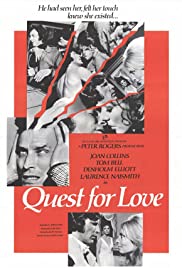
QUEST FOR LOVE
UK, 1971, 91 minutes, Colour.
Joan Collins, Tom Bell, Denholm Elliott, Laurence Naismith, Lyn Ashley.
Directed by Ralph Thomas.
The synopsis of the film indicates science-fiction; the title and the treatment indicate 'Love Story'. On the whole, the latter wins in an English but sentimental way. But the science-fiction ideas (based on a John Wyndham story) are worthwhile; what if time were not one unbreakable continuum, but could be split and people live in two simultaneous but different worlds? This basic premise is interestingly used and provides also a kind of Jekyll and Hyde theme where the one character has two quite different personalities and lives. An enjoyable film and, via the love story, very easily acceptable science-fiction.
1. What were the expectations of this title? Their fulfilment? How enjoyable was the film, how much warmth?
2. Which predominated: science-fiction or the love story? Which aspect of the film was better? Why?
3. What presuppositions do audiences have for science-fiction? The role of science, progress, imagination and fantasy, warnings for dangers. fears? Grappling with contemporary problems via science-fiction fable? How did this film do this? Well ?
4. How well did the film blend in the love story and the science-fiction? For whom was this film principally made? Why?
5. How credible was the plot? Was it presented credibly? The authentic London backgrounds, the relationships of facts and dates? The types of personalities involved? Everything recognizable to the audience yet strange?
6. The fascination of time and its mystery? Was the plot. as regards time, possible? The theories of the professor? What was really real? Did the film explain its theories plausibly?
7. How interesting was the theme of identity? The basic Jekyll and Hyde story? The insight into potential of each individual by portraying his two possible characters? Dissatisfaction with one world and imagining another? How interestingly and excitingly was this portrayed?
8. How well did the film cater to audience imagination about comparisons of the present world with another one? A world without war? A world with a different progress? Which of the two worlds was better? Both were 1970's worlds. List the pros and cons of each world and make comparisons. The film finished in the real world, so to speak. Was this preferable?
9. How well did the film involve us in the mystery? The explosion and the sudden transition to the other world without explanation? Should Colin have explained?
10. How easy was it to identify with Colin and share his mystery and bewilderment? How did the film contrive this for the audience?
11. Comment on the two Colins and their contrast: the good and the bad, selfish and selfless, using people, the search for identity etc? what insight into being human did this comparison give? The details of the two lives for comparisons?
12. The character of Ottilie - in herself, her capacity to be hurt, the heroine, having a second chance with life, the melodrama and pathos of her death, the effect on audiences and its handling - at the piano? The comparison with Tracey in another world? The chase, the optimism? Was this too facile a solution? How attractive was Ottilie-Tracey? How did this aid the film?
13. Contrast with Toms in each world. What comparisons were made?
14. The contrast with the two professors? The role of the professor in explaining the mystery? And a touch of humour?
15. How was this easy science-fiction,, romantic communication of science-fiction messages?